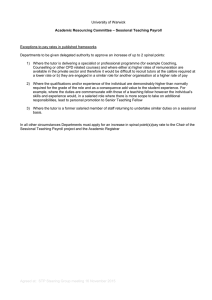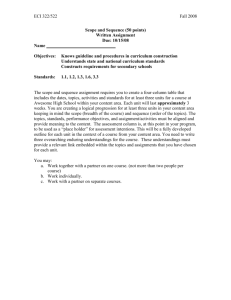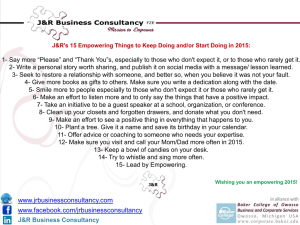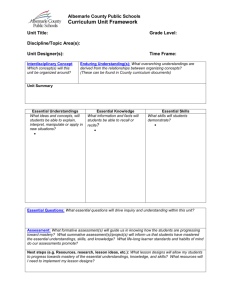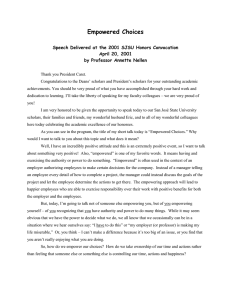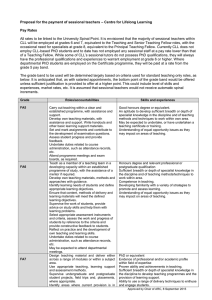A Teaching Philosophy: Wendy Wilson
advertisement
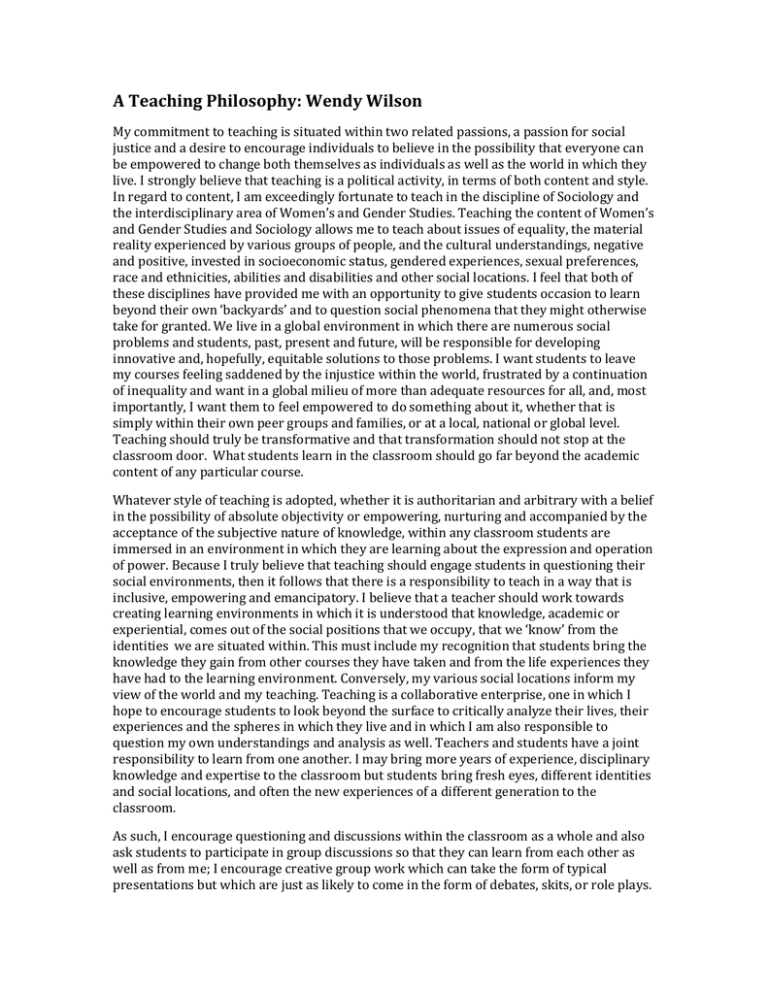
A Teaching Philosophy: Wendy Wilson My commitment to teaching is situated within two related passions, a passion for social justice and a desire to encourage individuals to believe in the possibility that everyone can be empowered to change both themselves as individuals as well as the world in which they live. I strongly believe that teaching is a political activity, in terms of both content and style. In regard to content, I am exceedingly fortunate to teach in the discipline of Sociology and the interdisciplinary area of Women’s and Gender Studies. Teaching the content of Women’s and Gender Studies and Sociology allows me to teach about issues of equality, the material reality experienced by various groups of people, and the cultural understandings, negative and positive, invested in socioeconomic status, gendered experiences, sexual preferences, race and ethnicities, abilities and disabilities and other social locations. I feel that both of these disciplines have provided me with an opportunity to give students occasion to learn beyond their own ‘backyards’ and to question social phenomena that they might otherwise take for granted. We live in a global environment in which there are numerous social problems and students, past, present and future, will be responsible for developing innovative and, hopefully, equitable solutions to those problems. I want students to leave my courses feeling saddened by the injustice within the world, frustrated by a continuation of inequality and want in a global milieu of more than adequate resources for all, and, most importantly, I want them to feel empowered to do something about it, whether that is simply within their own peer groups and families, or at a local, national or global level. Teaching should truly be transformative and that transformation should not stop at the classroom door. What students learn in the classroom should go far beyond the academic content of any particular course. Whatever style of teaching is adopted, whether it is authoritarian and arbitrary with a belief in the possibility of absolute objectivity or empowering, nurturing and accompanied by the acceptance of the subjective nature of knowledge, within any classroom students are immersed in an environment in which they are learning about the expression and operation of power. Because I truly believe that teaching should engage students in questioning their social environments, then it follows that there is a responsibility to teach in a way that is inclusive, empowering and emancipatory. I believe that a teacher should work towards creating learning environments in which it is understood that knowledge, academic or experiential, comes out of the social positions that we occupy, that we ‘know’ from the identities we are situated within. This must include my recognition that students bring the knowledge they gain from other courses they have taken and from the life experiences they have had to the learning environment. Conversely, my various social locations inform my view of the world and my teaching. Teaching is a collaborative enterprise, one in which I hope to encourage students to look beyond the surface to critically analyze their lives, their experiences and the spheres in which they live and in which I am also responsible to question my own understandings and analysis as well. Teachers and students have a joint responsibility to learn from one another. I may bring more years of experience, disciplinary knowledge and expertise to the classroom but students bring fresh eyes, different identities and social locations, and often the new experiences of a different generation to the classroom. As such, I encourage questioning and discussions within the classroom as a whole and also ask students to participate in group discussions so that they can learn from each other as well as from me; I encourage creative group work which can take the form of typical presentations but which are just as likely to come in the form of debates, skits, or role plays. Through these opportunities, students learn to work with and appreciate the knowledge, perspectives, and skills of others. I encourage students to choose topics for their written assignments which allow them to explore their personal interests and future goals; I ask them to write reflective papers which require them to engage thoughtfully with issues and experiences they encounter in their daily lives. Although I certainly lecture in order to provide interdisciplinary knowledge, I also show documentaries and require students to bring in materials from magazines, newspapers and from the internet that they have found themselves in regard to various topics. Learning should be life-long, taking place outside of the classroom and far beyond a postsecondary education. As a teacher and a scholar, I want students to see their daily lives as an ongoing opportunity to learn, analyze and critique. I want students to develop an analytical and critical attitude and a desire to look beyond the seemingly obvious assumptions we internalize and which often serve as the foundation for understanding our lives and the lives of others. I would hope students come away from the classroom feeling capable of being full participants in their own lives rather than merely bystanders that life happens to; I hope that students learn how to make informed decisions and choices, personally and politically, and are able to have some autonomy and control over the circumstances of the lives. I cannot end this philosophical statement without acknowledging the importance of support from one’s colleagues in having a positive teaching experience. It is always a challenge to be the teacher one wants to be and there are many things in life, both professional and personal, which make it difficult to consistently live up to one’s own pedagogical ideals. Since I began teaching as a sessional lecturer, I have consistently been offered support, mentorship, and respect from members of the Women’s and Gender Studies department/program, whether they were Heads of the department/program, tenured faculty, administrative assistants, or other sessional lecturers. Teaching within an interdiscipline which takes pedagogical concerns so seriously has positively informed my own teaching in ways that cannot be measured. Teaching within the supportive environment of Women’s and Gender Studies has made me a far better teacher than I would otherwise be.
